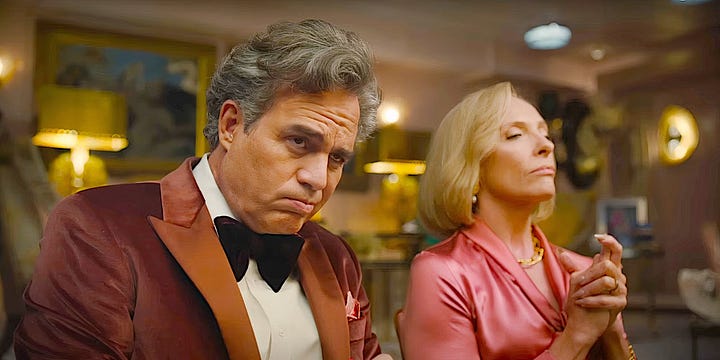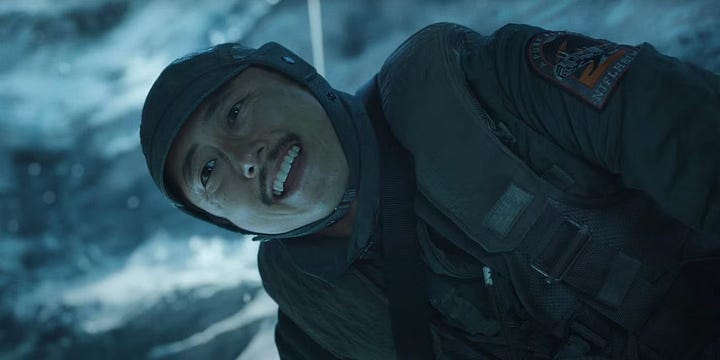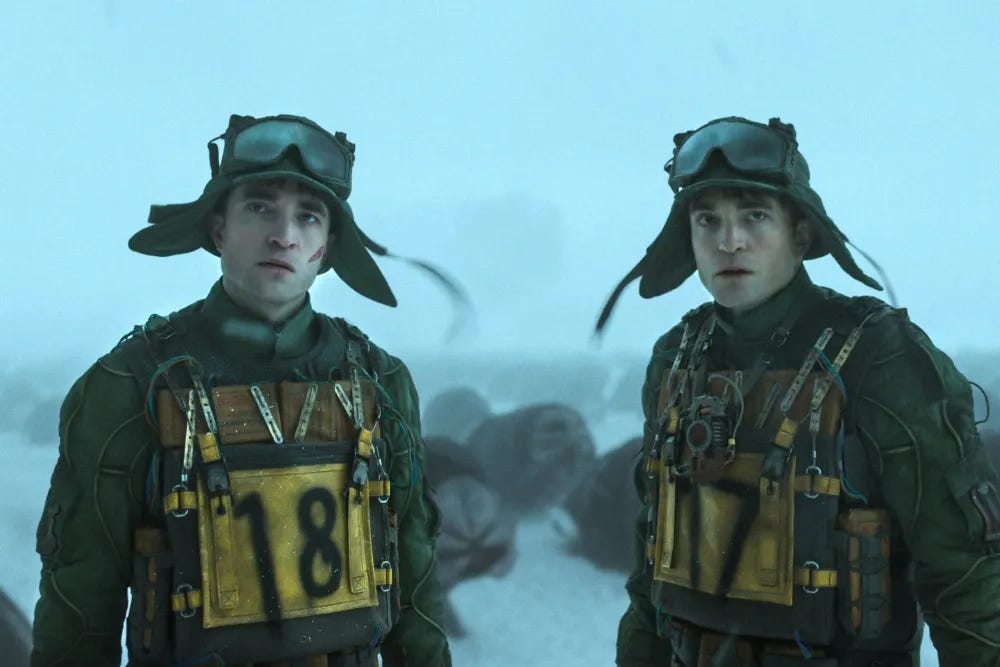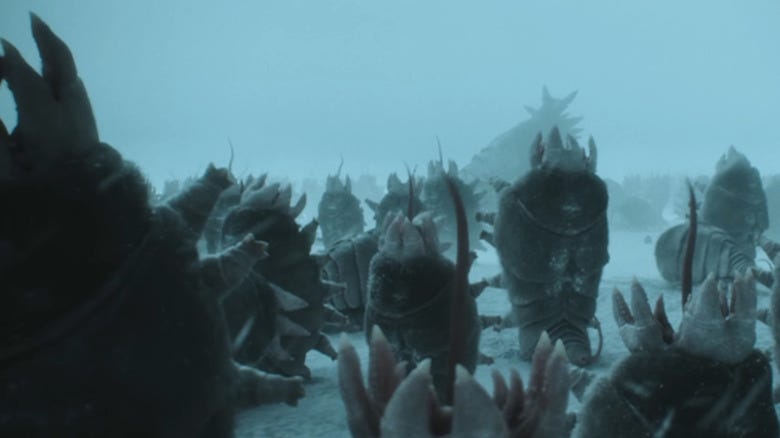REVIEW: Mickey 17 Has a Catharsis Problem
Despite an incredible performance from Robert Pattinson, Bong Joon Ho's mostly solid sci-fi epic falters when it comes to consequences for its deeply evil characters
This review contains spoilers!
Let’s make three things clear from the very beginning:
The movie is good! I liked the movie.
Robert Pattinson is extraordinary and should be in the Oscar conversation at the end of the year
Bong Joon Ho is a genius and even his imperfect films are 10,000x more imaginative and compelling than the average movie.
Okay, we good? We understand these three things? Great, now let’s jump into why Mickey 17, Bong Joon Ho’s first film since his Oscar-sweeping all-timer Parasite, is at times brilliant and at times deeply frustrating.
I’m sorry but in this economy, depriving an audience of justice is almost cruel! Let’s talk about it.
Justice for Mickeys 1-17
Mickey 17 is an adaptation of the critically acclaimed sci-fi novel Mickey7 by Edward Ashton, about a burnout dude named Mickey Barnes (Robert Pattinson, brilliant beyond reason here) who signs up to be an Expendable on an interstellar voyage to colonize an icy planet.
An Expendable, in brief, is a person whose biometric information is uploaded to a special brick that allows them to be “reprinted” after they die. So, essentially, Mickey can be killed in any number of ways and a new Mickey will be printed in about 20 hours or so. This means, he gets all the dangerous jobs on the voyage and, in many cases, is essentially a lab rat for all sorts of twisted science goals.
It’s a fascinating premise that leads to an even more fascinating conundrum: at some point, Mickey 17 is presumed dead after a fall into a ice cave and a new Mickey is printed, yet Mickey 17 survives, returns to the ship, and now there are “multiples.”
Love this! This is great. Pattinson creates two incredibly distinct Mickeys with ease. Mickey 17 is nervous and timid, but Mickey 18 is intense and bold, but in a way that feels believable from what we know about the original Mickey. Suddenly, Mickey 17 fears death for the first time. If he dies, and there’s already a replacement out and about, does he actually die for real? Also, how do the Mickeys handle their 4-year-plus relationship with the intense but loving girlfriend Nasha (Naomi Ackie, a needed breath of fresh air in this whole affair)?
Mickey 17 is best when it grapples with these big questions of life and death and personhood and empathy. It falters when it comes to fully addressing the inhumanity of the Expendables program and those who perpetuate it.
Hoo Boy This Ship is Full of Terrible People


The interstellar voyage is led by Marshall (a fun but skin-deep Mark Ruffalo), a blustering, vain, Tr**p-ian politician and his Lady MacBeth wife Ylfa (a delightful Toni Collette) who is more concerned about developing sauces than considering anyone else’s humanity. They see Mickey as less than human and a means to an end: developing their “pure” colony on Niflheim, the ice planet, so they can rule as king and queen. Their evil kicks into high gear when an alien species of giant fuzzy beetlebugs is discovered and Ylfa immediately wants to turn them into sauce (not joking) and Marshall wants to genocide them.
Also along for the ride is the Worst Friend in the Galaxy, Timo (an always great Steven Yeun) an old pal of Mickey’s who’s criminal tendencies are partly why Mickey signed up to be an Expendable. In the opening scene, we see Timo happily leave Mickey 17 to die in an ice cavern, because another Mickey will just be printed, right? Timo is awful, selfish, deeply uncaring, and the worst kind of manipulator.
There’s also an evil religious advisor (Daniel Henshall) giving megachurch Rasputin vibes, a team of truly callous and awful scientists, and some dude in a pigeon suit that I never fully understood.
These are awful people! They’re vile. Cartoonishly so. This alone is not a problem, as sometimes the best villains are simple in their evil (shout out to queen mother Malificent), but if you’re going to spend two hours conditioning your audience to hate the shit out of characters who are deeply irredeemable and do horrific things, there should at least be some consequences for their cruelty, right? Right?
There Are (Almost) No Consequences! It’s a problem!
Here’s where we get spoiler-y.
Let’s review what happens to all the bad people in this film:
Marshall and company are vile to the end, crowing for genocide, with only Marshall himself getting a moment of comeuppance. He’s blown up by Mickey 18, after one punch to the face, and dies in the distance on a computer screen. Ylfa’s fate is spoken about; she’s put into custody and then apparently kills herself. Timo, despite literally trying to make a snuff video chainsawing Mickey 17 into pieces so he can somehow send it back to Earth and thus escape his debts, is attacked in the denouement sequence by a thug, kills the thug, survives, represents himself in court and gets off scot free.
Marshall’s creepy advisor? He jumps off a land rover and then later we see a pan shot of him in prison with a bunch of different people.
And the science team? Nothing! Not a scratch, despite being the facilitators of Mickey’s torture for four-plus years. In fact, one of the science members, Miss Mousy Glasses (Patsy Ferran) gets completely redeemed. She creates a translator for the beetlebugs that helps save the day, and she even gets to hold a cute beetlebug in the final celebratory scene!

All this to say, it was deeply frustrating to watch Mickey suffer in so many ways and have almost no one care besides Nasha (and maybe Kai, another temporary love interest), and then all the cruelty just get so swiftly forgotten.
Maybe It’s Just A Me Thing?
Experiencing the wonder and the blunder that is Mickey 17 got me thinking, why is justice such a sticking point for me in films? Yes, my autism gives me an outsized sense of justice, but I also think we are living in an era where justice doesn’t seem to exist anymore. Bad people to terrible things every day, all over our social media feeds, and it feels sometimes like almost no one is ever held accountable or brought to justice.
So, to release a film like this now feels almost cruel, in a way, despite it’s technical beauty and innovative energy and Pattinson’s truly remarkable performance.
It’s not that every villain needs to experience consequences commensurate with their crimes. I love a complicated villain and appreciate when things get gray, nuanced, debatably moral. Like, part of the reason Parasite was so incredible was how nuanced it was with the morality and justifications of the characters’ behavior, and how the title began to apply to everyone in the film. But when you’re painting with as broad of brush as Bong Joon Ho uses in Mickey 17, I don’t think it’s unreasonable to expect at some broad catharsis. Or just a single lesson learned, by someone. Anyone.
For what Mickey had to endure, it feels like his tormentors mostly escaped any responsibility for their abuse, or at a base level weren’t even required to ever feel bad about it. For some, this may not be a problem, but for me, this time, in March 2025, it became something I couldn’t ignore.
Mickey 17 is still a wildly interesting effort, and well worth a watch. It bungles the landing, but pulls off many exciting moves before that, and maybe with time, in a different era where justice feels real again, it’s strengths may further come to light.









Yes! This was how I felt when Succession first came out - and I couldn't watch it for a few years. I was so tired of seeing rich white people fail upwards and have zero consequences. I became a fan during the pandemic and for some reason, it was easier to tolerate at that point. Perhaps I'd been broken completely by the state of the world? Who can say xoxo